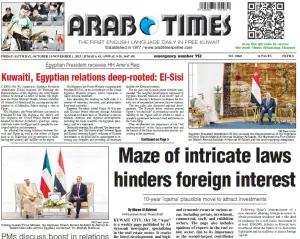British Minister of State for Trade Chris Bryant
KUWAIT CITY, Oct 30: British Minister of State for Trade Chris Bryant confirmed that the free trade agreement between Kuwait and the United Kingdom will be finalized very soon. At a press conference on the sidelines of his visit to the country on Wednesday, Bryant clarified, “I cannot give a precise date because I do not like setting artificial deadlines, but the truth is that the deadline I set was two weeks ago, and we are very close. There are just a few areas that need clarification between the two sides. We will hold another round of discussions next week in London.” He expressed his belief that there are many areas where the region aligns with the United Kingdom. He said, “We want to strengthen this alignment. We had very good discussions yesterday, perhaps the longest round of talks between ministers from both countries, but they were very positive. I am very optimistic that in the next few weeks, or at least very soon, we will be able to reach a signed and finalized free trade agreement between the two countries. There are just a few minor details that we need to amend or clarify. We are working on that right now.”
Regarding the details of the talks with the Kuwaiti side, he disclosed, “We focused on the free trade agreement. If we assume that we will sign the agreement soon, next year will be the year of real work to ensure its implementation and actual use, because signing the agreement is not enough if it is not put into effect.” As for his assessment of trade relations between Kuwait and the United Kingdom (UK), he stated “the relationship has been excellent for a very long time. Kuwait Investment Authority has a constant presence in Britain. There are ongoing discussions and a great deal of mutual respect.”
On what the UK can offer, he pointed out, “I want to see investment flowing in both directions. Kuwait has historically invested heavily in the UK. It could be argued that the current strength of the British stock market is partly due to Kuwaiti and other Gulf investments. In recent days, we announced a massive multibillion-pound fund to support British exporters who want to invest here in the Gulf under the UK Export Finance framework.” He explained that the agreement is not limited to oil, gas, iron, and steel, as it includes a wider range of products. He revealed that the UK launched a new industrial strategy earlier this year, identifying eight key sectors in which it believes it has a particular advantage, such as advanced engineering (including aerospace), financial services, and creative industries. He added that the main reason for his visit is to support and strengthen trade cooperation.
“Many people in the Gulf states have been doing business with the UK for years, decades and centuries. We want to build on this legacy. We are striving to finalize the free trade agreement as soon as possible,” he elaborated. Regarding the impact of Brexit on ithe economic relations of the UK with the Gulf states, Bryant said “if we were still members of the European Union (EU), I would not be here now negotiating a free trade agreement, because that would have been done by the EU.” Indicating this is his first visit to Kuwait, Bryant expressed his happiness over being in one of the oldest areas of human settlement in the world. He pointed out, “I am a historian. I have written many history books, so coming to a place where humans have lived since ancient times is very exciting and enjoyable,” Asked About the alignment of the agreement with the Kuwait 2035 vision, he said, “It is clear that any country that relies on a single industry will face future shocks. Therefore, economic diversification is crucial. We are ready to support Kuwait in this endeavor. We are already working on this; hence, the free trade agreement is so important, as it covers multiple sectors and reduces customs barriers and other obstacles to trade.”
By Fares Ghaleb Al-Seyassah/Arab Times Staff



